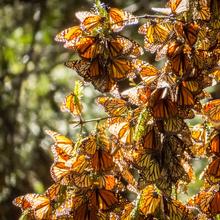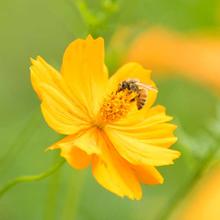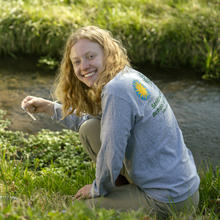- April 4, 2025
George Mason University’s Potomac Science Center on Belmont Bay is a destination for environmental science research within the Chesapeake Bay watershed. Slightly inland from shore, on a recent day in early March, the retention pond next to the center needed to be emptied to make changes to the drainage system. The Mason Nation was ready to rescue some of the creatures affected.
- November 8, 2024
On a recent field trip to Patuxent River Park in Upper Marlboro, Maryland, undergraduate students from George Mason University’s Smithsonian-Mason School of Conservation got to view secretive marsh birds up close, including Virginia and sora rail birds.
- June 7, 2024
What's one thing that all of these George Mason University students are wearing when handling salamanders? Well-fitted, sterile, hypoallergenic, slightly moistened gloves. These students participated in the Smithsonian-Mason School of Conservation’s two-week course CONS 440/540 Field Skills in Ecology course.
- February 17, 2023
Gwendolyne Fields’ life has been defined by a connection to natural landscapes across the world. Growing up outside of the U.S., Fields developed an awareness of how global issues like climate change impacted environmental degradation and species decline in multiple countries.
- February 6, 2023
In late September, 18 undergraduates from the Smithsonian-Mason School of Conservation‘s (SMSC) Wildlife Ecology and Conservation program tagged monarch butterflies on their journey south to help researchers better understand their grand migration.
- November 3, 2022
A team of Mason students held a bat box-building workshop as their capstone project in the Sustainability in Action class.
- October 4, 2022
Mason doctoral candidate Chelsea Gray's research on social attitudes helped demonstrate strong public support in Ireland for basking shark conservation.
- June 14, 2022
Bees see the world in vibrant color…but that may be changing. Smithsonian-Mason team researches the impact with bee vision.
- April 28, 2022
Road salt has been touted as a lifesaver when it comes to combatting icy roads. Yet using this snow-melting mineral has a dark side once it enters waterways. Graduating senior Maggie Walker, through the Smithsonian-Mason School of Conservation (SMSC), is gathering data at local streams to influence change.
- December 15, 2021
Mason senior Eva Noroski spent a month assisting alumna and Elephant Trails keeper Ashley Fortner at the National Zoo, researching elephant sleep patterns.









